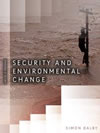Introducing
 Professor Simon Dalby obtained his Ph.D. (on cold war geopolitics) at Simon Fraser University.
Professor Simon Dalby obtained his Ph.D. (on cold war geopolitics) at Simon Fraser University.
He works at Carleton University in Ottawa, teaching courses in political geography, and is co-editor of the Geopolitics journal. Professor Dalby is specialised in critical geopolitics, environmental security and the geographical dimensions of global politics.
In this interview, Professor Dalby discusses the results of his research into the many aspects of security that spans more than 20 years. He talks about the Cold War, global warming, the ideas of Thomas Hobbes and John Locke, geographical imaginations, political discourses and so on. Professor Dalby concludes the interview with suggesting possible roles of geographers in improving global and local security conditions. This is part 1 of the interview. The other parts are:
Interview
Security, Identity and Otherness
Why is it so hard to come up with a generally applicable definition of security?
 Security is what is often called an essentially contested concept. The term is ubiquitous but used in numerous ways by various political actors and academics. National security is usually understood as the highest priority of states, and all other things, like democracy, justice and so on are subservient to the actions of state agencies. Order is usually paramount in security thinking and order is related to political stability.
Security is what is often called an essentially contested concept. The term is ubiquitous but used in numerous ways by various political actors and academics. National security is usually understood as the highest priority of states, and all other things, like democracy, justice and so on are subservient to the actions of state agencies. Order is usually paramount in security thinking and order is related to political stability.
The aftermath of the Second World War produced all sorts of discussions of collective security under the rubric of the United Nations. Its executive committee, charged mostly with preventing war, is called the Security Council. Global security related to threats of nuclear destruction but has morphed into discussions of political stability related to all sorts of phenomena.
In the last couple of decades as numerous things have been added onto security, these conceptualisations have become ever more contested, so that we now have discourses of economic security, human security and environmental security. Most recently we have something called climate security although no two policy makers using the term seem to agree on what it might actually mean in practice.
Why do you claim that “the central political concept of security is formulated as the exclusion of Otherness”? [1990]
During the cold war period much security discourse in Washington in particular, but to a substantial extent in Moscow too, was about keeping outside threats to the respective blocs from undermining social and political arrangements. National security, or ‘reasons of state’ trumped all other claims to legitimate action, and did so on the basis of preventing threats to the political order. These were usually seen as foreign, and dramatically different, hence Other in that they were a direct challenge to the identity being protected. “Keeping the bad guys out”, as one of my students once put it in a seminar at Carleton University, linked a very obvious geography of threats from communists in the West, and viewed from Moscow, dangerous CIA agents and others who worked to undermine the USSR.
What roles do geographical representations play in notions of (in)security and (national) identity?
These vary widely, but frequently those who are different, and threatening to our order, identity and way of life, are portrayed as coming from somewhere else. Geographical language structures politics in terms of our space being that where virtue, safety, culture and prosperity lie; their space is foreign, different and hence potentially threatening. When difference becomes threatening tropes of security are invoked to justify preparation for conflict and reinforce group identities.
Marx is sometimes quoted as saying security is a key bourgeois concept. Certainly it is highly prevalent in most modern political discourse, and the idea of it being an urban modern term concerned about rural and peripheral threats to metropolitan areas and their inhabitants is apt for many of its uses in political discourse. The war on terror was in many ways about remote peripheral threats to the urban global polity.
What were the central ideas of Thomas Hobbes and John Locke and why do you argue that they “have dominated the geographical imagination for far too long”? [2010]
What I meant there is that Hobbes’ focus on Leviathan or the state, with its social contract, in which rulers promise to protect those who have supposedly agreed to be subjects of that ruler, has shaped our understanding of politics as fundamentally a matter territorial states. This has become the ordering principle for humanity.
Related to this is the theme from John Locke that property and ‘improvement’ of nature are key to modern humanity, a territorial arrangement for wealth extraction that precludes taking non-modern modes of life seriously, and promotes the individual male farmer/producer as the key human identity that is in need of security.
Combined these have shaped so much of our political thinking that now, in the face of the current circumstances of global transformation, we have great difficulty formulating appropriate geopolitical modes of thinking to address the current crisis.
